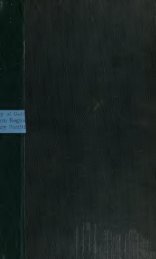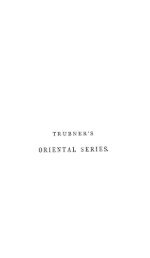Untitled
Untitled
Untitled
Create successful ePaper yourself
Turn your PDF publications into a flip-book with our unique Google optimized e-Paper software.
I<br />
(,<br />
'<br />
(i<br />
90<br />
r . < <<br />
' FOURTH DISCOURSE. ON PHYSICIANS<br />
name of 'his sweetheart al^o. Then I told h/jn my conclusion,<br />
and he could not deny it, but was compelled to confess the<br />
* truth."<br />
t Qabus was greatly astopished at thi^ treatment and was filled<br />
with wonder, and indeed there was good for<br />
reason<br />
astonishment.<br />
" O most glorious, eminent and excellent Qne," said he, " both the<br />
lover and the beloved are the children of my sisters, and are<br />
cousins to one another. Choose, then, an auspicious moment<br />
that I may unite them in marriage." So Master Abu All chose<br />
a fortunate hour, and irtit the marriage-knot was tied, and lover<br />
and beloved were united, and that handsome young prince was<br />
delivered from an ailment which had brought him to death's<br />
door. And thereafter Qabus maintained Abu 'Ali' c in the best<br />
manner possible, and thence he wen,t to Ray, and finally became<br />
minister to the Shahinshah 'Ala'u'd-Dawla<br />
( 1<br />
as indeed is well<br />
,<br />
known in the history of Abu 'All ibn Sina's life.<br />
ANECDOTE XXXVII.<br />
The author of the Kdmilus-Sind'at 2 was physician to 'Adudu'd-Dawla<br />
3 in Pars, in the city of Shiraz. Now in that (A) city<br />
there was a porter who used to carry loads of four hundred and<br />
five hundred maunds on his back. And every five or six months<br />
he would be attacked by headache, and become restless, remain-<br />
ing so for ten days or a fortnight. One time he was attacked by<br />
this headache, and when seven or eight days had elapsed, and<br />
he had several times determined to destroy himself, it finally<br />
happened that one day this great physician passed by the door<br />
of his house. The porter's brothers ran to meet him, did reverence<br />
to'hirfi, and, conjuring him by God Most High, told him about<br />
their brother's condition and headache. " Show him to me," said<br />
the physician. So they brought him before the physician, who<br />
saw that he was a big man, of bulky frame, wearing on his feet<br />
- a pair of shoes each of which weighed a maund and a half. Then<br />
the physician felt his pulse and asked for and examined his<br />
urine; after which, "Bring him with me into the open country,"<br />
said he. They did so, and on ^heir arrival there, he bade his<br />
servant take the porter's turban from his head, cast it found his<br />
neck, and twist it tight. Then he ordered another servant to<br />
take the shoes off the porter's feet and strike him twenty<br />
blows on the head, which he accordingly did. The porter'? sons<br />
lamented loudly, but the physician was a man of consequence<br />
1 He was the son of Dushmanziyar, ruler over Isfahan from A.H. 398 to 433<br />
(A. I}. 1007-1041), and is commonly known as Ibn Kakawayhi or Kakiiya.<br />
a See Brockelmann's Gesch. d. Arab. Litt., vol. i, p. 237, No. 19. His name was<br />
'All ibnu'l-'Abbas al-Majusi, and he died in A.H. 384 (A.D. 994). For some account<br />
of his life and work see Note XXVII at the end, and also p. 79 sttpra, n. 2 ad calc.<br />
3 The second prince of the House of Buya, reigned A.H. 338-372 (A.D. 949-982).








![La religione di Zarathustra nella storia religiosa dell' Iran [microform]..](https://img.yumpu.com/15970820/1/151x260/la-religione-di-zarathustra-nella-storia-religiosa-dell-iran-microform.jpg?quality=85)


